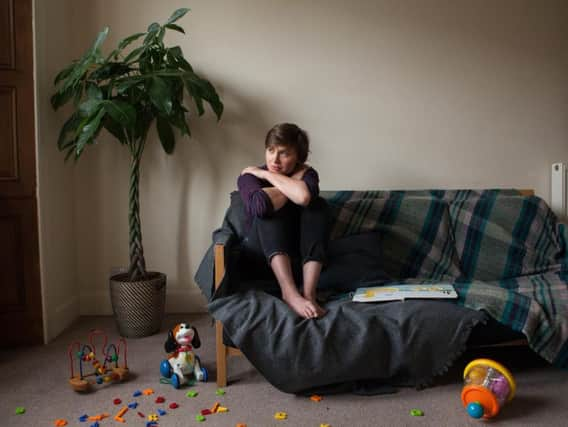Domestic abusers should lose tenancies, and victims supported to prevent homelessness, says new guide for landlords


Scottish Women's Aid has today launched a new best practice guide for social housing landlords, including local authorties, which supports keeping victims in their homes and the abuser losing their right to the tenancy.
The organisation says that domestic abuse is the number one cause of women and children’s homelessness in Scotland, and the guidance will help councils and housing associations offer a safer and more consistent approach to dealing with the issue.
Advertisement
Hide AdAdvertisement
Hide AdCurrent housing policy and practice responses are based on expecting those experiencing domestic abuse, rather than perpetrators, to leave their homes. As a result, says SWA, many women looking for support are made homeless by the services meant to help them.
"Often women are told that their only housing option when they are separating from an abusive partner is to make a homeless application. Being forced to become homeless adds to the trauma of domestic abuse and comes at a huge emotional and financial cost."
She added: “Women are hugely concerned about the impact on their children of having to leave their home, often moving multiple times. This impacts on children’s emotional wellbeing and health, and their education if they have to move school. They can also experience bullying, loss of friends and support at a time when they really need it.
"This new guidance will be available to every social landlord and every local authority in Scotland, meaning the potential is there to change the future for thousands of women and children."
According to statistics, domestic abuse is the biggest cause of women’s homelessness in Scotland, with 78 per cent of homelessness applications from women in 2017-18 giving the reason as ‘a dispute within the household (violent or abusive)’ - and more than half had children on their application.
Scottish Women’s Aid has partnered with the Association of Local Authority Chief Housing Officers, the Chartered Institute of Housing Scotland, the Scottish Federation of Housing Associations and Shelter Scotland to produce the guide.
The guide encourages landlords to develop a domestic abuse housing policy for tenants which prevents homelessness and addresses the housing needs of women and children who experience domestic abuse.
It recommends landlords should "strengthen women’s and children’s rights to remain in the home, for example, by supporting women to transfer tenancies into their names" and there should also be the provision of "security measures and specialist support" while "details of the action you will take against the perpetrator" should be written into tenancy agreements.
Advertisement
Hide AdAdvertisement
Hide AdIt also says policies should include intervening "effectively with tenants who perpetrate domestic abuse", promoting a proactive approach to domestic abuse with all tenants and housing partners, and uses the Scottish Government definition of domestic abuse, which includes coercive control.
The guide also features first-hand accounts from women who had been made homeless as a result of domestic abuse and the challenges they faced when seeking help from their local council, often having to repeat and retell their stories in a way that is re-traumatising.
One woman said: “Having to repeat my circumstances over and over again was humiliating and distressing to me. I was also worried about a negative reaction of not being believed every time I had to explain to a new person.”
Callum Chomczuk, National Director of the Chartered Institute of Housing Scotland, said: “Victims of domestic abuse, like all of us, rely on housing, but our sector has much to do to help those at risk of – or experiencing – domestic abuse. Too many housing organisations do not have a policy which recognises domestic abuse.
"This means that victims are, at times, made homeless by the services that are meant to help them. In Scotland, domestic abuse is given as the main reason by women making a homeless application.
“That is why this guidance for social landlords is so important. Victims of abuse cannot afford to wait any longer. It will set out a clear framework so landlords not only ensure victims have a secure, stable home but they can then build care and support services around that person’s needs.”
The guidance includes good practice examples, checklists for best practice in responding to domestic abuse and templates for domestic abuse policies and the Convention of Scottish Local Authorities will distribute it across councils.
Annette Finnan, co-chair of the Association of Local Authority Chief Housing Officers, said: “The sector has been too slow to see the need to improve our approach to domestic abuse. I’m confident that the publication of this new guidance and our working relationship with Scottish Women’s Aid and others will provide the impetus we need to start to get it right for those facing the challenges of moving on from domestic abuse.”
Advertisement
Hide AdAdvertisement
Hide AdAlison Watson, Deputy Director of Shelter Scotland, said: “At Shelter Scotland we know that there are many reasons for homelessness and domestic abuse is often an issue that our helpline advisers have to deal with.
“At a time of great personal trauma and uncertainty – with many different factors in place for each case – guidance that brings a safe and more consistent approach is good news for people experiencing homelessness as a result of domestic abuse.”
SWA's Jo Ozga added: “We know there is more to do and we will continue to campaign for a gendered approach to homelessness in Scotland. However, we believe this good practice guide will be an invaluable tool in improving the responses to women, children and young people experiencing the trauma of coercive control and we will work with our partners to ensure consistency in those responses."
* Scotland’s Domestic Abuse and Forced Marriage Helpline is available 24/7 on 0800 027 1234. For more support and help click here